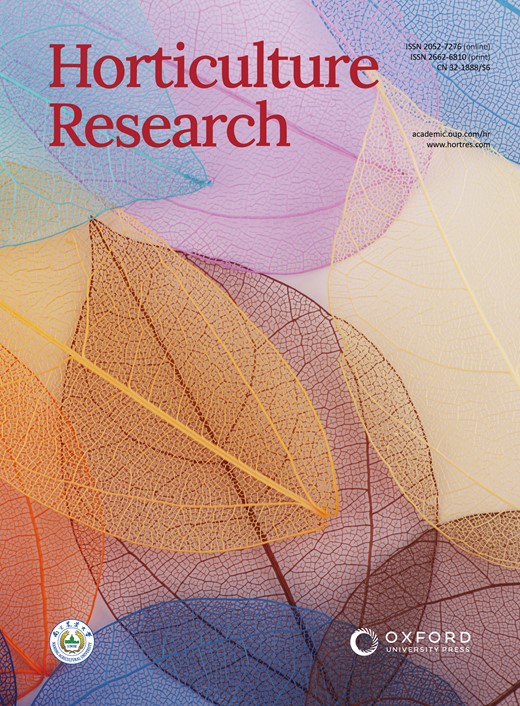A cost-effective oligo-based barcode system for chromosome identification in longan and lychee
IF 8.5
1区 农林科学
Q1 Agricultural and Biological Sciences
引用次数: 0
Abstract
Oligonucleotide (Oligo)-based fluorescence in situ hybridization (FISH) represents a highly effective methodology for identifying plant chromosomes. Longan is a commercially significant fruit species, yet lacking basic chromosomal markers has hindered its cytogenetic research. In this study, we developed a cost-effective oligo-based system for distinguishing chromosomes of longan (Dimocarpus longan Lour., 2n = 2x = 30). For this system, each synthesized oligo contained two chromosome-specific sequences that spanned a distance of over 200 kb, and a PCR-based flexible amplification method coupled with nested primers was used for probe labeling. The use of these oligo-based barcodes enabled the marking of 36 chromosomal regions, which allowed for the unambiguous distinction of all 15 chromosomes in both longan and lychee (Litchi chinensis Sonn., 2n = 2x = 30) species. Based on the identification of individual chromosomes, we constructed karyotypes and detected genome assembly errors involving the 35S ribosomal RNA gene (35S rDNA) in longan and lychee. Developing oligo-based barcodes offers considerable promise for advancing cytogenetic research in longan, lychee, and their related species. Furthermore, this cost-effective synthesis system can be referred to the development of new oligo libraries among other species.用于龙眼和荔枝染色体鉴定的低成本高效益寡核苷酸条形码系统
基于寡核苷酸(Oligo)的荧光原位杂交(FISH)是鉴定植物染色体的一种高效方法。龙眼是一种具有重要商业价值的水果品种,但由于缺乏基本的染色体标记,其细胞遗传学研究受到了阻碍。在这项研究中,我们开发了一种基于寡聚物的经济有效的系统,用于区分龙眼(Dimocarpus longan Lour.,2n = 2x = 30)的染色体。在该系统中,每个合成的寡核苷酸都包含两个染色体特异序列,它们之间的距离超过 200 kb,探针标记使用了基于 PCR 的灵活扩增方法和嵌套引物。使用这些寡核苷酸条形码可以标记 36 个染色体区域,从而明确区分龙眼和荔枝(Litchi chinensis Sonn., 2n = 2x = 30)的全部 15 条染色体。根据单条染色体的鉴定结果,我们构建了核型,并检测了龙眼和荔枝中涉及 35S 核糖体 RNA 基因(35S rDNA)的基因组组装错误。开发基于寡核苷酸的条形码为推进龙眼、荔枝及其相关物种的细胞遗传学研究提供了广阔的前景。此外,这种具有成本效益的合成系统还可用于开发其他物种的新寡核苷酸文库。
本文章由计算机程序翻译,如有差异,请以英文原文为准。
求助全文
约1分钟内获得全文
求助全文
来源期刊

Horticulture Research
Biochemistry, Genetics and Molecular Biology-Biochemistry
CiteScore
11.20
自引率
6.90%
发文量
367
审稿时长
20 weeks
期刊介绍:
Horticulture Research, an open access journal affiliated with Nanjing Agricultural University, has achieved the prestigious ranking of number one in the Horticulture category of the Journal Citation Reports ™ from Clarivate, 2022. As a leading publication in the field, the journal is dedicated to disseminating original research articles, comprehensive reviews, insightful perspectives, thought-provoking comments, and valuable correspondence articles and letters to the editor. Its scope encompasses all vital aspects of horticultural plants and disciplines, such as biotechnology, breeding, cellular and molecular biology, evolution, genetics, inter-species interactions, physiology, and the origination and domestication of crops.
 求助内容:
求助内容: 应助结果提醒方式:
应助结果提醒方式:


